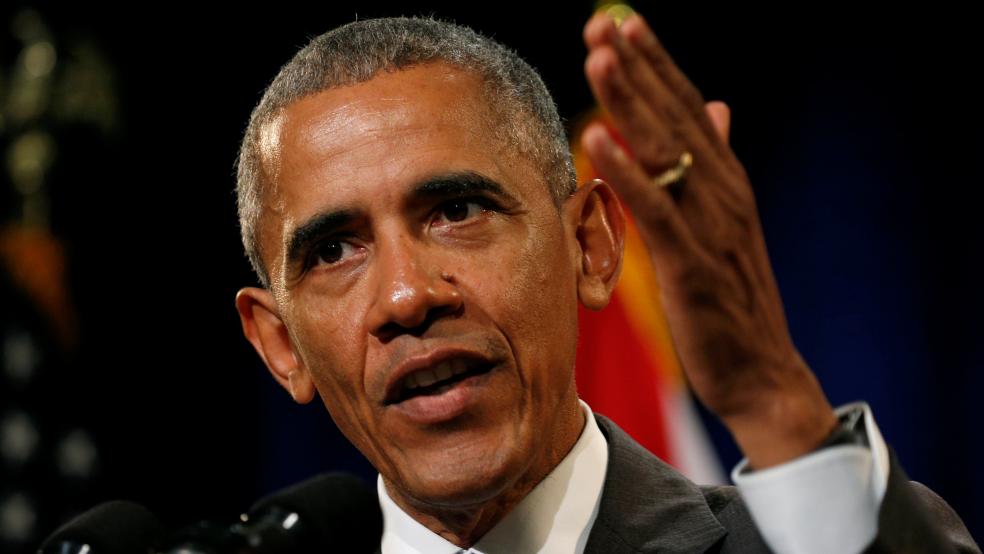Building on the momentum generated by favorable rulings from the Supreme Court on the Affordable Care Act and same-sex marriage, and on a major victory on trade policy, President Obama on Monday night announced that he would move forward with a plan to rewrite the rules governing who must be paid overtime for working more than 40 hours per week. But another win for the president is by no means assured: He will face considerable opposition from both business leaders and GOP lawmakers.
“We've got to keep making sure hard work is rewarded,” the president wrote in an article published on The Huffington Post last night. “Right now, too many Americans are working long days for less pay than they deserve. That's partly because we've failed to update overtime regulations for years -- and an exemption meant for highly paid, white collar employees now leaves out workers making as little as $23,660 a year -- no matter how many hours they work.”
Related: Obama Chalks Up Two Big Wins to Burnish His Legacy
The regulations the president referred to implement the Fair Labor Standards Act, which mandates that workers who put in more than 40 hours a week be paid one-and-a-half times their hourly wage for each hour over 40. But the regulations, in place for generations, contain an exception for salaried workers. The exception was originally meant to cover just people with an “executive” function, but the failure to update the income threshold since 1975 or to index it to inflation means that it now applies to people making the equivalent of $11.38 per hour.
“There are too many people who should be getting overtime pay but are not,” said economist Jared Bernstein, a senior fellow at the Center on Budget and Policy Priorities whose research with fellow economist Ross Eisenbrey helped prod the administration to make the change. “This rule change will update a key labor standard, one that's been in place since 1938, to help give these workers the overtime coverage they deserve.”
The administration’s plan would effectively adjust the income threshold to reflect inflation since the last time it was raised, more than doubling it to $50,400 a year.
“That's good for workers who want fair pay, and it's good for business owners who are already paying their employees what they deserve -- since those who are doing right by their employees are undercut by competitors who aren't,” Obama wrote.
Related: The Obamacare Opportunity the GOP Is Missing
“The new overtime rules come at a time when businesses from Wal-Mart to full-stack start-ups are increasing the wages of the lower paid members of their workforces,” said Dana Muir, a professor of business law at the University of Michigan’s Ross School of Business. “Adequate compensation is important to retain excellent and motivated employees, particularly in today's economy where customer interactions and service play such a prominent role in many business models. Entitlement to overtime is a factor, like salary and benefits, in motivating already stretched workforces.”
Not surprisingly, many employers see a stark difference between making the business decision to raise wages and being forced to do so by the federal government. The National Retail Federation, whose members would be among the most broadly affected by the rule, warns of dire unintended consequences.
According to the NRF, “A dramatic increase of the overtime salary threshold is likely to reduce job-advancement opportunities for hourly workers, raise the use of part-time, entry-level workers while cutting the hours of full-time workers and increase the overall costs of doing business.”
While the Obama administration has the authority to update the FLSA rules, it will have to go through the standard federal rulemaking process, which involves a lengthy period of notice and comment before a final rule can be adopted. Once adopted, the rule will almost certainly be challenged in court, possibly delaying its implementation indefinitely.
Related: A Big Gay Marriage benefit – Financial Security
Retailers and other business interests opposing the law will likely find allies in Congress willing to help in an effort to derail the change. Congress has little direct control of the rulemaking process, which is the prerogative of the executive branch. However, Labor Secretary Tom Perez is likely to be hauled up to Capitol Hill to face angry legislators in Congressional hearings.
What Congress might do is attach a rider invalidating the rule change to a piece of must-pass legislation, like a key appropriations bill. However, the optics of pushing a bill to deny an estimated 5 million low-to-medium pay workers overtime might be tricky and such a bill would have a hard time clearing the Senate, where Democrats still have the ability to filibuster.
If a bill with that sort of rider made it to the president’s desk, Obama could be forced to choose between a full or partial government shutdown and his new overtime rules.
Top Reads from The Fiscal Times:





